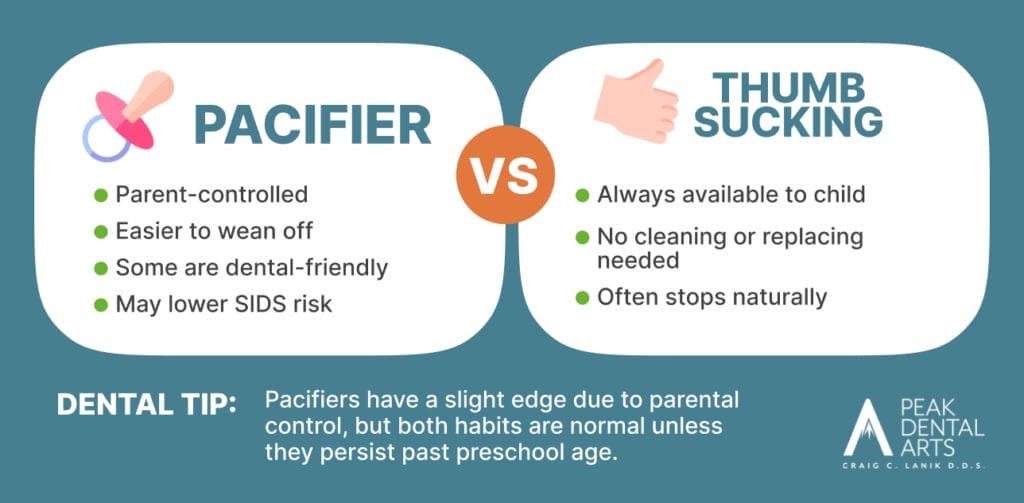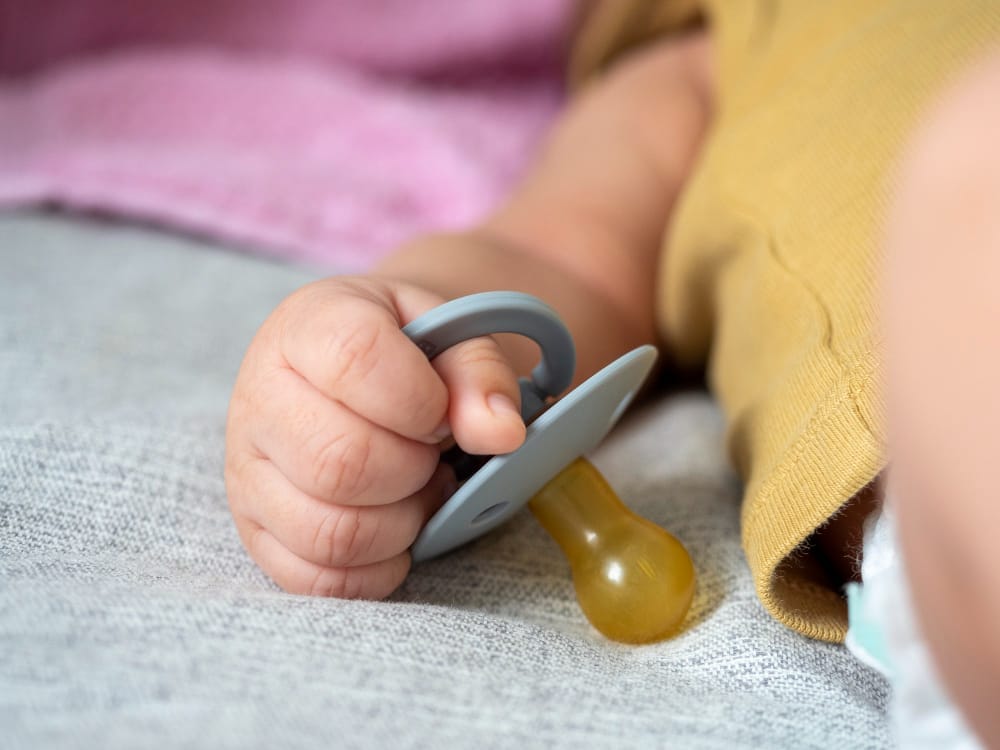As parents, we’ve all been there—that moment of peace when your fussy baby finally finds comfort in a pacifier or their own thumb. The silence is golden, but in the back of your mind, you might be wondering: “What is this doing to my child’s developing teeth?”
Today, we want to help you navigate this common parenting dilemma with confidence.

The Natural Need for Babies to Thumb Suck
Babies are born with a natural sucking reflex. It’s one of their first coordinated muscle movements and serves an important purpose beyond nutrition. Sucking helps babies feel secure and calm, organize their sensory experiences, and even regulate their emotions. Whether it’s a pacifier, thumb, or fingers, this self-soothing behavior is completely normal in infants and toddlers.
This natural developmental stage is observed in approximately 90% of newborns who display some form of non-nutritive sucking behavior. It’s their way of exploring the world and finding comfort as they adjust to life outside the womb.
When Pacifiers and Thumb Sucking Affect Dental Development
The good news is that pacifier use and thumb sucking aren’t typically problems in very young children. Most children naturally stop these habits on their own between ages 2 and 4 as they find other ways to comfort themselves and interact with their environment.
However, prolonged sucking past age four can begin to influence the development of your child’s mouth, jaw, and teeth. Here’s what can happen with persistent sucking habits:
The upper front teeth may tilt outward or become misaligned. The lower front teeth might tilt inward. The jaw can develop asymmetrically, creating an open bite (where the front teeth don’t meet when the back teeth are closed). The roof of the mouth might narrow, potentially leading to cross bites. Speech development may be affected, particularly with sounds like “s,” “z,” and “th.”
The severity of these changes typically depends on how intensely, frequently, and long your child engages in the sucking behavior. A child who passively rests their thumb in their mouth will likely have fewer dental effects than one who vigorously sucks for hours throughout the day and night.

Pacifiers vs. Thumb Sucking: Which Is Better?
Parents often ask whether a pacifier is preferable to thumb sucking or vice versa. There are pros and cons to each.
Pacifiers offer parents control over when to introduce and remove them. They can be taken away completely when it’s time to stop. Orthodontic or “dental-friendly” pacifiers are designed to put less pressure on developing teeth. Some research suggests pacifiers might reduce the risk of SIDS in infants.
Thumb or finger sucking is always available to the child for self-soothing. There’s no risk of losing it or forgetting it. There’s no need to clean or replace it. This habit is often self-limiting as children mature.
From a dental perspective, pacifiers might have a slight advantage simply because parents can control access. That said, both habits are perfectly normal for young children and only become dental concerns when they continue well into the preschool years.
Helping Your Child Stop With Gentle Approaches
If your child continues thumb sucking or pacifier use beyond age 4, it’s worth beginning to discourage the habit before permanent teeth start coming in around age 6. We recommend these gentle approaches:
Focus on positive reinforcement rather than punishment or shame. Praise your child when they’re not sucking, and consider creating a simple reward system to celebrate success. Identify trigger situations (like tiredness or anxiety) and help your child find alternative coping strategies for those moments. For pacifiers, consider a gradual approach—limiting use to bedtime first, then phasing it out completely. For thumb suckers, gentle reminders and diversionary tactics work better than criticism. Involve your child in the process by explaining the importance of healthy teeth in age-appropriate terms.
Remember that patience is key. Breaking a comforting habit takes time, and there may be setbacks along the way. Your dental professional can provide additional guidance tailored to your child’s specific situation.

When to Seek Professional Dental Advice
While most children will outgrow these habits without intervention, it’s worth discussing persistent thumb sucking or pacifier use during regular dental checkups, especially if:
Your child is approaching or past their 4th birthday and shows no signs of stopping. You notice changes in their tooth alignment or bite. There are concerns about speech development. Your child experiences teasing or social issues related to the habit.
Pediatric dental professionals can monitor your child’s oral development and may recommend gentle interventions if needed. In some cases, a simple conversation with a trusted dentist about the importance of stopping can be motivational for children.
For persistent habits that are affecting dental development, your dentist might suggest a special oral appliance that serves as a gentle reminder not to suck. These are typically only used as a last resort when other methods haven’t been successful.
Finding the Right Balance
As with many parenting challenges, addressing thumb sucking and pacifier use requires balancing immediate needs with long-term considerations. The comfort these habits provide to young children is real and valuable. There’s no need to rush to eliminate them in babies and toddlers.
By staying informed and working closely with your dental professional, you can help your child transition away from these soothing habits at the appropriate time, ensuring their smile develops beautifully while still honoring their emotional needs.

